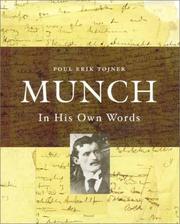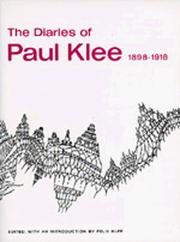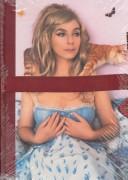| Listing 1 - 6 of 6 |
Sort by
|
Book
ISBN: 9029502738 9789029502733 Year: 1997 Volume: 215 Publisher: Amsterdam Antwerpen De arbeiderspers
Abstract | Keywords | Export | Availability | Bookmark
 Loading...
Loading...Choose an application
- Reference Manager
- EndNote
- RefWorks (Direct export to RefWorks)
Dagboekaantekeningen van een artistieke en mondaine Oekraïense jonge vrouw in Parijs (1858-1884), die een deel van haar leven weidde aan de schilderkunst
Bashkirtseff, Marie --- anno 1800-1899 --- Ukraine --- 75.07 --- Vrouwelijke kunstenaars --- Dagboeken ; dagboeknotities --- Bashkirtseff, Marie 1858-1884 (°Havrontsi, Oekraïne) --- Schilderkunst ; schilders A-Z --- Artists --- Writers --- Book --- Correspondence --- Diary
Book
ISBN: 9789462086098 9462086095 Year: 2020 Publisher: Rotterdam NAI
Abstract | Keywords | Export | Availability | Bookmark
 Loading...
Loading...Choose an application
- Reference Manager
- EndNote
- RefWorks (Direct export to RefWorks)
Philip Akkerman (1957) has kept a diary since his academy days. This diary describes his struggle with the mystery of existence, his struggle with art and the art world, his struggle with painting technique and his struggle with himself. The question is whether without this diary he would ever have started painting self-portraits and, if he had already started painting, how long he would have maintained it. 'Philip Akkerman. Artist Diary 'takes you into the chaotic flood of contradictory thoughts in Akkerman's head. Slowly but surely, the 'real' Philip Akkerman emerges. In addition to texts about philosophy and painting techniques, the reader also gets a glimpse into the art world where nothing and no one is spared. Philip Akkerman (1957) houdt sinds zijn academietijd een dagboek bij. Dit dagboek beschrijft zijn worsteling met het bestaansmysterie, zijn worsteling met de kunst en de kunstwereld, zijn worsteling met de schildertechniek en zijn worsteling met zichzelf. Het is de vraag of hij zonder dit dagboek ooit met het schilderen van zelfportretten begonnen zou zijn en, indien hij er al mee begonnen zou zijn, hoe lang hij dit dan volgehouden zou hebben. 'Philip Akkerman. Kunstenaarsdagboek' neemt je mee in de chaotische stortvloed van tegenstrijdige gedachten in het hoofd van Akkerman. Langzaam maar zeker komt de 'echte' Philip Akkerman bovendrijven. Naast teksten over filosofie en schildertechniek krijgt de lezer ook een inkijkje in de kunstwereld waarbij niets en niemand gespaard wordt.
Painters --- 75.07 --- Akkerman, Philip °1957 (°Vaassen, Nederland) --- Dagboeken ; dagboeknotities --- Artists --- Schilderkunst ; schilders A-Z --- Akkerman, Philip, --- diaries --- art criticism --- Akkerman, Philip --- artists' books [books]

ISBN: 3791324942 Year: 2001 Publisher: Munich Prestel Verlag
Abstract | Keywords | Export | Availability | Bookmark
 Loading...
Loading...Choose an application
- Reference Manager
- EndNote
- RefWorks (Direct export to RefWorks)
Munch, Edvard --- Edvard Munch 1863-1944 (° Loten, Hedmark, Noorwegen) --- Kunst en spiritualiteit --- Symbolisme --- Sezession ; Berlijn --- Dagboeken ; dagboeknotities ; brieven ; E. Munch --- Autobiografieën --- Schilderkunst ; 1880-1944 ; Edvard Munch --- Schilderkunst ; grafiek ; Expressionisme --- 75.07 --- Schilderkunst ; schilders --- Artists --- Munch, Edvard, --- Munch, E. --- Munk, Ėdvard, --- Munch, Edward, --- מונק, אדוארד --- מונק, אדווארד --- Munks, Edvards, --- Munch, Edvard.

ISBN: 0520006534 9780520006539 Year: 1992 Publisher: Berkeley University of California Press
Abstract | Keywords | Export | Availability | Bookmark
 Loading...
Loading...Choose an application
- Reference Manager
- EndNote
- RefWorks (Direct export to RefWorks)
Paul Klee was endowed with a rich and many-sided personality that was continually spilling over into forms of expression other than his painting and that made him one of the most extraordinary phenomena of modern European art. These abilities have left their record in the four intimate diaries in which he faithfully recorded the events of his inner and outer life from his nineteenth to his fortieth year. Here, together with recollections of his childhood in Bern, his relations with his family and such friends as Kandinsky, Marc, Macke, and many others, his observations on nature and people, his trips to Italy and Tunisia, and his military service, the reader will find Klee's crucial experience with literature and music, as well as many of his essential ideas about his own artistic technique and the creative process.
Artists --- Diaries. --- Schilderkunst ; 1ste helft 20ste eeuw ; Paul Klee --- Kunsttheorie ; dagboeken ; brieven ; essays ; Paul Klee --- Dagboeknotities ; reflecties over kunst en architectuur --- Dagboeken ; dagboeknotities --- Klee, Paul 1879-1940 (°Münchenbuchsee, Bern, Zwitserland) --- 75.07 --- Schilderkunst ; schilders A-Z --- dagboeken (genre) --- Klee, Paul --- anno 1900-1999 --- KLEE (PAUL), PEINTRE ET THEORICIEN ALLEMAND, 1879-1940 --- ARTISTES ECRIVAINS --- PEINTURE MODERNE --- 20E SIECLE

ISBN: 1900828065 Year: 1999 Publisher: London Violette Editions
Abstract | Keywords | Export | Availability | Bookmark
 Loading...
Loading...Choose an application
- Reference Manager
- EndNote
- RefWorks (Direct export to RefWorks)
Double Game was the first major publication in English by French artist Sophie Calle (born 1953), and is her bestselling title to date. It takes the form of a double jeu or double game between the work of Sophie Calle and the fiction of Paul Auster. The story begins with Maria, a fictional character in Paul Austers novel, Leviathan. Most of the fictional Marias works are, in fact, based on those of the real-life Sophie Calle. The first section of Double Game features Calles representations of the fictional Marias works. We see the pieces both as they're described in their fictional context and as Calles own interpretation of the descriptions from Paul Austers novel. In the second section, the story delves deeper into Calles world, with a sequence of Calles seminal narrative and abstract works in texts and images that were in turn appropriated by the fictional Maria in Leviathan. The third section of Double Game switches the focus back to Marias original creator, Paul Auster, who takes Calle as his subject, formulating for her the Gotham Handbook, which offers personalized instructions for the artist on How to Improve Life in New York City.
Calle, Sophie °1953 (°Parijs, Frankrijk) --- Kunst + literatuur ; Sophie Calle en P. Auster ; Leviathan --- Fotografie ; performances ; 1980-1999 ; Sophie Calle --- Dagboeken ; dagboeknotities ; brieven --- Vrouwelijke kunstenaars --- 7.07 --- 7.038 --- Kunstenaars met verschillende disciplines, niet traditioneel klasseerbare, conceptuele kunstenaars A - Z --- Kunstgeschiedenis ; 1950 - 2000 --- Calle, Sophie --- Art --- Auster, Paul
Book
ISBN: 9071346196 Year: 1994 Publisher: Amsterdam Uitgeverij Duizend & Een
Abstract | Keywords | Export | Availability | Bookmark
 Loading...
Loading...Choose an application
- Reference Manager
- EndNote
- RefWorks (Direct export to RefWorks)
Calle, Sophie °1953 (°Parijs, Frankrijk) --- Fotografie ; performances ; 1994 ; Sophie Calle --- Kunst + literatuur ; Sophie Calle ; Het adresboekje --- Dagboeken ; dagboeknotities ; brieven --- Kunst ; van vrouwen ; 20ste eeuw --- Kunst en feminisme --- 7.07 --- 7.038 --- Kunstenaars met verschillende disciplines, niet traditioneel klasseerbare, conceptuele kunstenaars A - Z --- Kunstgeschiedenis ; 1950 - 2000 --- Calle, Sophie
| Listing 1 - 6 of 6 |
Sort by
|

 Search
Search Feedback
Feedback About
About Help
Help News
News